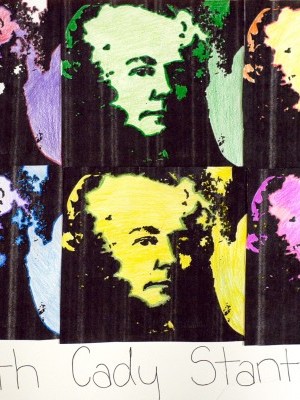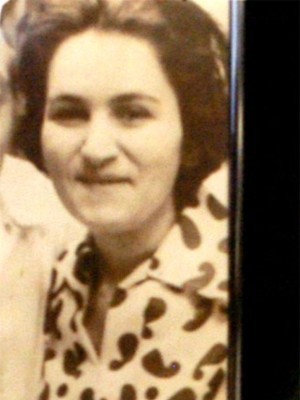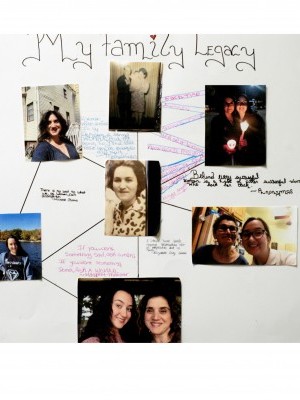Lenette Aaron, Italia Acevedo, Elizabeth Adamita, Natalie Cintron, Sophia Crawford, Nailah Curry-Jenkins, Kiara Fernandez, Stephanie Gutwirth, Sabrina McCarthy, Alexandria Mikelis, Sarah Owen, Giulia Troia, and Ann Villamarin
Fontbonne Hall Academy | Brooklyn, NY | 12th Grade
Historical Figure I Admire
Elizabeth Cady Stanton
Elizabeth Cady Stanton was born on November 12, 1815, in Johnstown, New York. Stanton was educated at Johnstown Academy and later at Emma Willard’s Troy Female Seminary, where she graduated in 1832. She studied law at her father’s office, where she learned about the unequal laws presented against women. Her father, Daniel Cady, was a well-known lawyer who had served in Congress on the New York State legislature. He also served as a judge in the New York State’s Supreme Court. Her mother, Margaret Livingston Cady, came from a wealthy family who played a role in the American Revolution.
On May 1, 1840, Elizabeth Cady Stanton married Henry Stanton who was an abolitionist lecturer and lawyer. At their wedding ceremony, she insisted that the word “obey” be dropped from their vows. The pair had seven children together. Each of them continued their parent’s legacies. Stanton worked alongside her husband and became an ardent abolitionist. During their first year of marriage, Elizabeth and Henry attended the World’s Anti-Slavery Convention in London. Stanton was furious when no women were recognized for their contributions; this is the moment where she began to fight for women’s rights. Elizabeth Stanton died on October 26, 1902, 18 years before women gained the right to vote.
Elizabeth Cady Stanton lived during the turbulent Antebellum period in which increased sectionalist tensions between slave states and non-slave states in the United States ultimately resulted in the breakout of the Civil War. After the war ended, African Americans were granted the right to vote under the 15th Amendment. Leaders of the women's reform movement, including Stanton, were angry and disheartened since they felt they should have been granted the right to vote as well.
Trade unions began in the mid 19th century, women were excluded from them. In 1875 Dewsbury woolen weavers initiated a strike to protest their 10% pay cut. The success of this strike inspired women to form the first female trade union. Clementina Black was one of two female delegates on the Women’s Trade Union Council and she was also the first to propose the idea of equal pay for women. In the late 19th century, women became disproportionately involved in local government. Women were permitted to vote in the urban district, rural district and parish council elections in 1894. But in Congressional elections, women were not allowed to vote.
Over the course of her life, Elizabeth Cady Stanton made countless contributions to the suffrage cause. Stanton wrote and published books such as The Woman's Bible and The Solitude of Self. Stanton’s accomplishments set the precedent for women's rights. Her first major work was the passage of the Married Women's Property Act of 1848, which allowed women to own and control the property. Such property was protected from seizure or any other action by any creditor of her husband. Also in 1848, she organized the Seneca Falls Convention which was the first women’s rights convention in the United States. This launched the Suffrage Movement and Stanton introduced her Declaration of Sentiments, modeled off the Declaration of Independence. This included the extremely famous line “that all men and women are created equal”.
Stanton was the president of the Woman’s State Temperance Society. In 1854, she addressed the New York State Legislature and her speech helped pass an 1860 bill. During the Civil War, she became a staunch abolitionist as well as setting the precedent for other suffragettes to follow her lead. In 1878, she created the suffrage amendment with Susan B. Anthony, later becoming the 19th amendment. Although she died before the 19th Amendment her hard work and contributions to the movement helped blaze the way for the next generation of suffragists to witness its passage.
Inspirational Family Member
Angeliki Vandoras
My grandmother, Angeliki Vandoros came to the United States from Greece, alone at the age of 18 after a deadly earthquake hit Kefalonia in 1953. It was one of the biggest fiascos to ever happen to Kefalonia.
In the search for a new and better life, Angeliki followed her husband to America for a new life. She made the journey in 1966 and opened a traditional Greek diner in 1967. The diner was extremely hard work; she barely saw her husband because she woke up at 3 in the morning to get to the diner by 5 and start work immediately. She would help out wherever she could but also spent most of her time raising her two daughters.
She came over when she was 18 (she was born in 1948) and had to wait five years to become a citizen. She was able to vote on November 17, 1969. The first election that she participated in was the New York State Election in 1970. She voted for Nelson Rockefeller, who was re-elected as Governor of New York. Her first Presidential Election that she participated in was the 1976 election. Although Gerald Ford won, she voted for the Democratic nominee James Earl Carter Jr. or Jimmy Carter. Voting made her feel very proud that she could be a part of the process and how the government runs. She was able to see how the government works. She told me that coming from another country and getting to have the same rights as someone who was born here, was a very big step and she felt very grateful for the opportunity to have a better life. She also told me she was very emotional and she still is very proud to be a citizen of the US.
What the Project Means to Me
Voting is a right that all Americans deserve, yet women before us did not have this privilege. Women should celebrate how far we have come in political equality, but we also use our vote as an opportunity to gain equality in other domains. For example, women can use our suffrage to gain equal pay and help pass laws for more equal rights. We believe that voting on all levels, local, state, and federal, protects the foundation of democracy.
Women in the early 1900s fought long and hard for the right to vote and we, as women, in today’s society should not take that right for granted. Women are not treated equally in every aspect of life but the right to vote grants women political equality. Voting in local elections allows women to share their views in their local community. Participation in local elections is important because the outcome directly affects them and their families. State and federal elections, in some way, determine the future of the country. Women should especially take advantage of voting in these elections because it will have an effect on generations to come.
We believe it is very important to be aware of the history of women voting in our families. These stories give us a greater sense of how privileged we are to have this right because our family members did not have this. Their stories also give us tangible evidence as to how far women have come on this issue.
Explore the Archive
Deadline Extended
There's still time to join Women Leading the Way.
Become a part of our storytelling archive. Enroll your class today.
Join the Project



